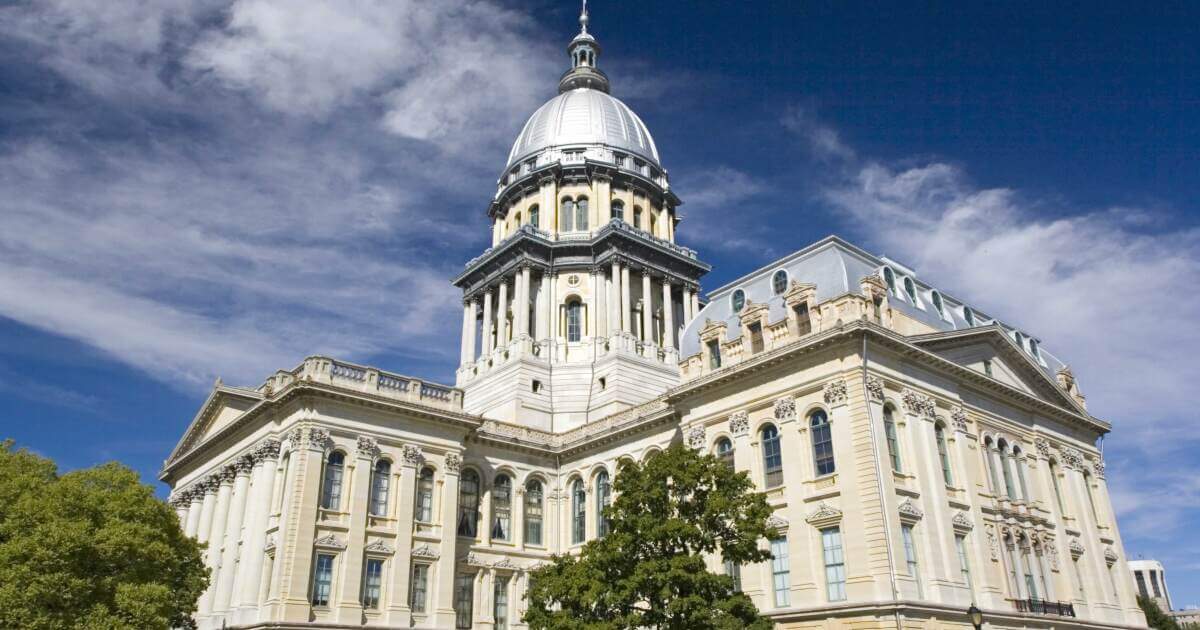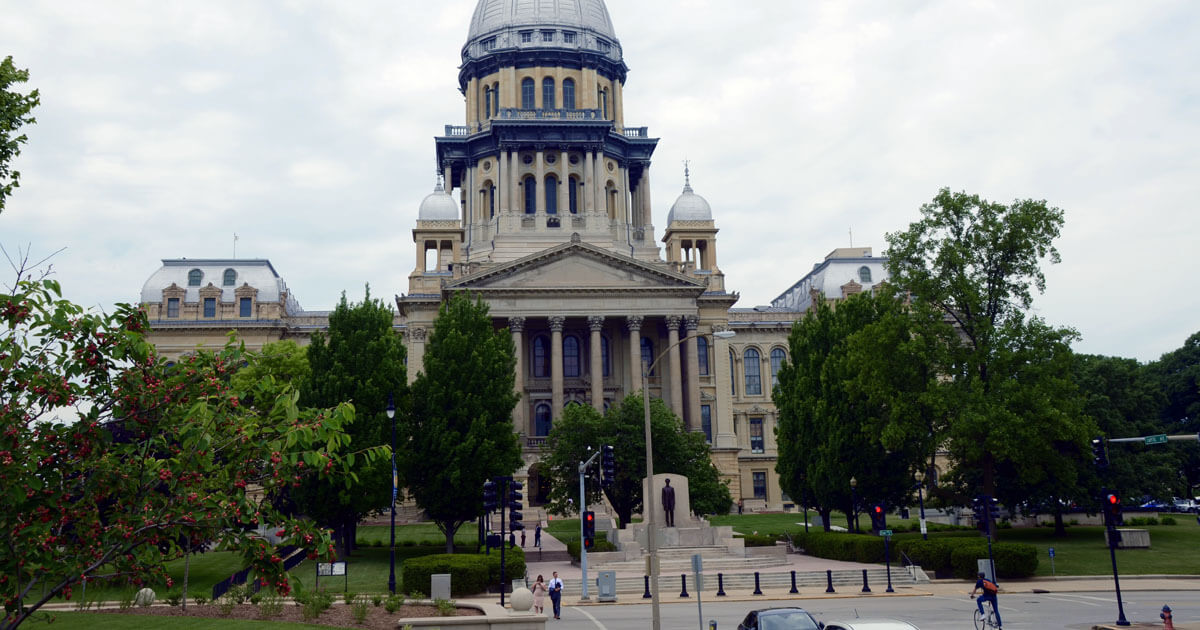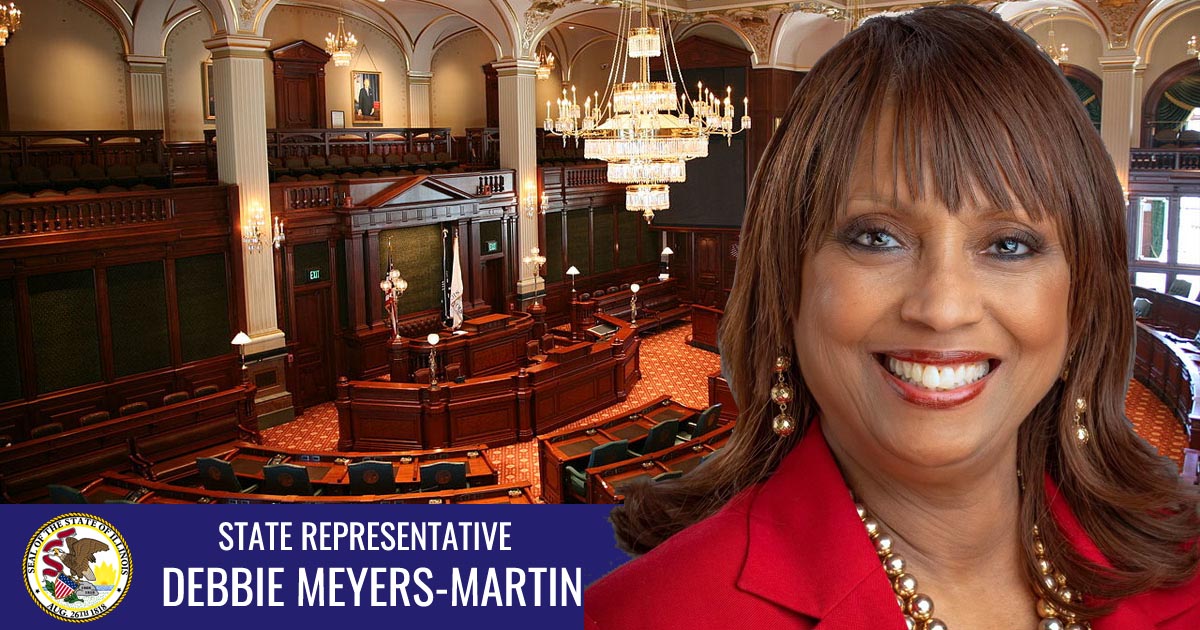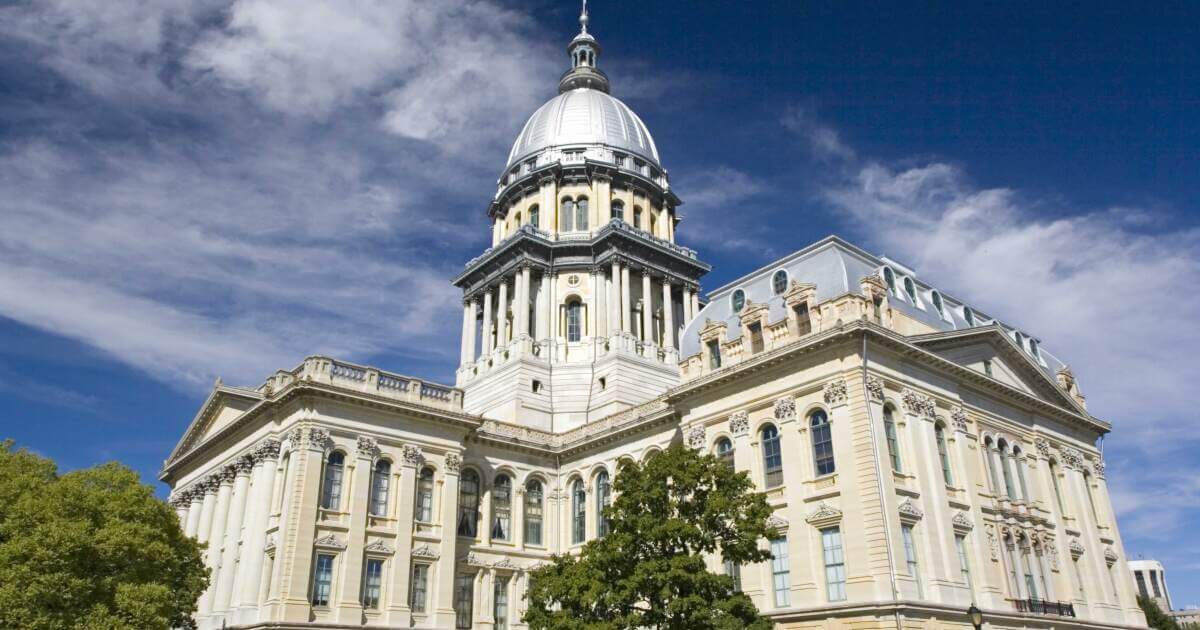Meyers-Martin Speaks to Bernie Mac Sarcoidosis Foundation, Highlights Efforts to Promote Treatment of Deadly Condition
ORLAND PARK, Ill. — State Rep. Debbie Meyers-Martin, D-Olympia Fields, was a featured speaker at the “Purple Carpet Fundraiser” of the Sarcoidosis-awareness Bernie Mac Foundation on Saturday, April 5. Meyers-Martin spoke about her successful efforts to pass a 2021 bill promoting awareness of sarcoidosis, an inflammatory disease that killed the group’s founder, Chicago comedian Bernie Mac, in 2008.
“Sarcoidosis is a serious illness that disproportionately affects the Black community and can lead to life-changing, or even deadly, complications,” Meyers-Martin said. “Promoting awareness of sarcoidosis can lead to greater investment and help prevent lives being cut tragically short. The hard work and dedication of advocacy groups like the Bernie Mac Foundation are instrumental in building a future in which sarcoidosis and other incurable ailments have cures.”
Meyers-Martin’s House Bill 590, designating each April as Sarcoidosis Awareness Month in Illinois, was signed into law on July 23, 2021 by Gov. J.B. Pritzker, and became effective on January 1, 2022.
TAX SALE REFORM BILL ADDRESSES LONGTIME DISPLACEMENT OF BLACK AND BROWN FAMILIES
CHICAGO, IL – A new state legislative proposal seeks to prevent longtime owner-occupants from losing their homes to investors in the Cook County annual tax sale. SB 74 and HB 1238 were introduced respectively by Senator Robert Peters (D-South Shore) and Representative Debbie Meyers-Martin (D-Matteson) in Springfield.
The legislation creates a monthly payment plan for homeowners who fall behind on their property tax bill and exempts them from the annual tax sale so long as their payment plan is in good standing. Currently, homeowners must pay their delinquent taxes in full within one year, plus compounding interest, to avoid being subject to the annual tax sale where they can be acquired by investors in a bidding process.
“The Cook County annual tax sale has been robbing South and West side homeowners of their assets for far too long,” said Sarah Brune, Director of Public Policy at Neighborhood Housing Services of Chicago. She added, “Even those who administer the tax sale agree that it’s time for change.”
The annual tax sale has been shown to have significant disparate impacts on Black and Brown communities. Cook County Treasurer Maria Pappas, who administers the tax sale, has released a series of reports and interviews on the topic. Treasurer Pappas has publicly endorsed a list of needed reforms including interest reduction and a payment plan option.
This initiative is led by Neighborhood Housing Services of Chicago, Housing Action Illinois, the Chicago Community Trust, Communities United, the Chicago Rehab Network, and the Chicago Community Loan Fund. This reform is also supported by the Housing Policy Task Force, a coalition of more than twenty advocacy and housing organizations working to increase access to the wealth-building opportunities of home ownership for people of color.
Meyers-Martin Applauds Illinois’ Recent Credit Rating Upgrade
OLYMPIA FIELDS, Ill. – State Rep. Debbie Meyers-Martin, D-Olympia Fields, is celebrating yet another step in rebuilding the state’s fiscal house as Illinois has earned its ninth credit upgrade rating in two years.
“I was proud to help pass this year’s budget which reflects Illinoisans’ desire for fiscal responsibility,” Meyers-Martin said. “I am committed to repairing the calamitous effects of the Rauner administration’s budget impasse and major financial institutions are taking note.”
Ratings reflect a state’s credit quality. This most recent increased credit rating from Fitch Ratings highlights the growing strength and stability of Illinois’ fiscal house and allows the state to borrow at a lower interest rate, thereby saving taxpayers millions of dollars each year. Two other major financial institutions, S&P Global and Moody’s, have also increased Illinois’ credit rating to an “A” or “stable” rating.
“This most recent credit rating increase moves the goals of this year’s budget forward. Instead of being bogged down by higher interest rates, Illinois will have more funds to repair our roads, improve our schools and provide vital services to seniors.”
Meyers-Martin Advances Slate of Bills to Improve Communication Between Hospitals, Emergency Contacts
SPRINGFIELD, Ill. — State Rep. Debbie Meyers-Martin, D-Matteson, has advanced a bill out of the House Health Care Availability & Accessibility Committee to streamline the process of designating an emergency contact for hospital patients and for notifying these contacts of changes in the patient’s condition.
“When a person experiences a medical crisis, one of the most important things, beyond preserving the health of the patient, is ensuring that the patient’s loved ones are informed of important developments in their condition,” Meyers-Martin said. “When a patient’s family member arrives at the hospital only to suddenly be told that their loved one’s condition is not what they were led to believe, that’s not right. We owe both our patients and their families a system that does better than that.”
Meyers-Martin’s House Bill 1332 requires that whenever a hospital licensed under Illinois’ Hospital Licensing Act admits a person for inpatient care, that this patient be provided with an opportunity to designate an emergency contact. If the patient chooses to do so, the bill would require that the hospital reach out to this emergency contact to ask how and when they wish to be notified of significant changes in the patient’s condition, including death—whether immediately over the phone, in person at the hospital, or by some other method.
Meyers-Martin filed the bill in response to incidents in which families were told to come to the hospital to see their loved one, only to be told on arrival that the loved one had passed away.
“We have to remember that the fundamental goal of healthcare is, in a way, keeping families intact and patients in the lives of their loved ones,” Meyers-Martin said. “Of course, that happy ending isn’t always possible. But when it’s not, we still have a responsibility to the patient to inform their loved ones in a caring and respectful manner and to those loved ones to be a source of comfort, not of confusion, in an already difficult time. This legislation simply facilitates the improved communication which I believe is crucial to that goal.”
Meyers-Martin Emphasizes Affordable Childcare, Child Tax Credit, Education Funding
PRINGFIELD, Ill. — State Rep. Debbie Meyers-Martin, D-Matteson, finished the spring legislative session by securing a new child tax credit, fighting for a more equitable future and devoting major funding to public education.
“Our spending needs to focus on moving Illinois forward in fiscal and social responsibility,” Meyers-Martin said. “Initiatives to better serve our communities with affordable healthcare and education are part of promoting economic security and growth for all. A new child tax credit will help working families pay their bills and cutting $1 billion in medical debt removes a serious financial burden that can financially drag patients down for years.”
Budget expansions Meyers-Martin worked for include $4 million to lower maternal mortality rates by funding new birthing centers. Other community care services will include more in-home assistance for senior citizens. Meyers-Martin also worked to put $350 million in evidence-based funding into public school classrooms, on top of the over $1 billion in the past four years, as well as a new $50 million child tax credit that will put more money in the pockets of modest-income families.
“I’m proud of this session in the General Assembly, which was productive in creating new protections and preventative measures to build a more equitable Illinois,” Meyers-Martin said. “Noise pollution has been a constant source of frustration in my community, and communities across Illinois, and I’m proud to say that steps taken in past months will put a stop to that nuisance for thousands of people. We are also going to put more effort into looking at inequality in our business community so steps to combat bias and injustice it can be well-informed.”
Meyers-Martin sponsored House Bill 5232, combating racial discrimination through funding new research. In addition, Meyers-Martin also co-sponsored Senate Bill 3175 which will promote geographic equity in allowing highway noise suppression efforts, improving the lives of people across the state affected by noise pollution.
Meyers-Martin Responds to Budget Address, Prioritizes Affordable Healthcare, Childcare Expansions, Small Business Support
SPRINGFIELD, Ill. — State Rep. Debbie Meyers-Martin, D-Matteson, issued the following response to Gov. Pritzker’s Budget address on Wednesday:
“In coming months, I will work with colleagues to craft a budget that works for everyone in Illinois, but the proposed budget we heard today is an encouraging framework on which to build that. Major expansions to childcare programs, pushing for affordable healthcare and especially new programs to support small businesses will help us build a stronger future for our state. I am also eager to pursue Governor Pritzker’s proposed legislation to streamline our health insurance eligibility regulations. Continuing fiscally-responsible spending of taxpayer dollars towards these priorities is essential.”
STATE REP HELPS FAMILY GIVE LOVE ON VALENTINE’S DAY
OLYMPIA FIELDS, IL – On November 25, 2023, Richard Moore was tragically killed in a one-car accident at Western & Joe Orr Road in Olympia Fields. He was just 23-years-old. Moore was a donor recipient and an organ donor, himself. He began fighting chronic kidney disease at 17. By 19, while attending Jackson State University, he slipped into full kidney failure, that forced him to return to the Chicagoland area. Moore was a building maintenance professional at Blackhawk Primary Center in Park Forest, IL with aspirations of becoming a teacher – having been inspired by the elementary school children he interacted with.
On this Valentine’s Day, February 14, 10 am at Fresenius Kidney Care Center, 2609 Lincoln Hwy, Olympia Fields, IL 60461, the Moore family (along with 38th District State Representative, Debbie Meyers-Martin) will see through one of Richard’s final wishes – to honor those who facilitated granting him a new lease on life with his new kidney! “Richard was a real delight. He made our job of caring for him easy. Always a smile, a kind word, always appreciative. We are moved that he is STILL showing us love,” says Fresenius Kidney Care Clinic Manager, Jocelyn Noyes.
Two weeks before his tragic accident, Moore paid a surprise visit to his medical team at Fresenius Kidney Care South Suburban to express his deep appreciation of the care they provided him and to update them on his incredible progress. Later, Moore expressed to his mother that he HAD to do something ‘special’ for them. Before he could, he was gone. But he left his love.
The Moore group will deliver Richard’s Valentine Day care packages & gift cards to the 23 employees at Fresenius Kidney Care Center – love from Richard! The Moore family also received word that more of Richard’s ‘love’ was being spread around with the donation of his own organs that restored not one, but TWO, people’s eyesight! “My son was considerate, supportive, responsible and giving – as you can see by his organ donation and the gifts to Fresenius. I was proud to be his Dad,” said Fred Moore. “It is only fitting that on the day we celebrate love, is the very day we GIVE love, on behalf of my beautiful son, to those who
loved him through his transplant journey,” added his mother, Blevian Moore. Along with Moore’s mother, father & Meyers-Martin, Moore’s twin brother Rivage and sisters Ravetta and Tamika will also be on hand for this moving presentation.
Meyers-Martin Holding Winter Coat and Toy Drive
MATTESON, Ill. — State Rep. Debbie Meyers-Martin, D-Matteson, is holding her ‘2nd Annual New Coat Drive for Women and Men and Toy Drive with Their Children’ in partnership with the Blessed Child Organization to benefit underserved families during the winter months.
“As we enter Illinois’ chilly winter months, it is especially important to consider the impact a lack of proper clothing can have, and what we can do for families who can’t afford it,” Meyers-Martin said. “I encourage the community to come out and support families who are having a difficult time right now, and ensure they have a happy and safe holiday season with generous donations of new coats for women and men and toys for kids.”
Donations will be accepted from Nov. 6 through Dec. 11, at four locations:
Debbie Meyers-Martin’s office, at 813 School avenue in Matteson, IL
Hours of operation are Monday through Friday, 10 a.m. to 2 p.m.
Richton Park Community Center, at 4445 Sauk Trail, in Richton Park, IL
Hours of operation are Monday through Friday, 9 a.m. to 7 p.m.
Hazel Crest Village Hall, at 3601 west 183rd street in Hazel Crest, IL
Hours of operation are Monday through Friday, 8 a.m. to 5 p.m.
Country Club Hills City Hall, at 4200 west 183rd street in Country Club Hills, IL
Hours of operation are Monday through Friday, 8 a.m. to 5 p.m.
For more information, call 312-498-1106.
Meyers-Martin Announces Student Illinois Innovation Challenge, Opportunity to Develop Computer Science Skills
SPRINGFIELD, Ill. — State Rep. Debbie Meyers-Martin, D-Matteson, is announcing an opportunity for Chicagoland students to learn about developing technologies, convene workforce development partnerships and create interactive exhibits: the Illinois Innovation Challenge. The event will be held on Dec. 9, from 9:30 a.m. to 2:30 p.m., at the Google Office in Chicago, on 320 North Morgan.
“Kids need opportunities to build up practical skills and develop original ideas, maybe nowhere more than in a rapidly-evolving field like computer science,” Meyers-Martin said. “This challenge is going to give hundreds of our kids that chance, as well as to hear from computer science experts. I encourage people who are interested to sign up soon, as spaces are limited.”
In addition to the innovation challenge portion of the event, there will be multiple seminars to learn about computer science and other emerging technologies. The event is being put on by the Illinois Department of Innovation and Technology in partnership with HIGH-TECH-CHI, Chicago’s Department of Family and Support Services, CS for Success and Discovery Partners Institute.
Participants must be between 12-20 and be residents of the state of Illinois. Registration is required. To register and learn more details, visit https://www.eventbrite.com/e/high-tech-chi-tickets-735862874667?aff=oddtdtcreator.
“In addition to fostering learning, events like this help our kids build confidence and individualism, and help them feel comfortable in spaces that can be intimidating, such as computer science,” Meyers-Martin said. “Illinois is growing into a nationwide leader in new technologies, and this event will bring us closer to that goal.”
Meyers-Martin Applauds Illinois’ Recent Credit Rating Upgrade
OLYMPIA FIELDS, Ill. – State Rep. Debbie Meyers-Martin, D-Olympia Fields, is celebrating yet another step in rebuilding the state’s fiscal house as Illinois has earned its ninth credit upgrade rating in two years.
“I was proud to help pass this year’s budget which reflects Illinoisans’ desire for fiscal responsibility,” Meyers-Martin said. “I am committed to repairing the calamitous effects of the Rauner administration’s budget impasse and major financial institutions are taking note.”
Ratings reflect a state’s credit quality. This most recent increased credit rating from Fitch Ratings highlights the growing strength and stability of Illinois’ fiscal house and allows the state to borrow at a lower interest rate, thereby saving taxpayers millions of dollars each year. Two other major financial institutions, S&P Global and Moody’s, have also increased Illinois’ credit rating to an “A” or “stable” rating.
“This most recent credit rating increase moves the goals of this year’s budget forward. Instead of being bogged down by higher interest rates, Illinois will have more funds to repair our roads, improve our schools and provide vital services to seniors.”







